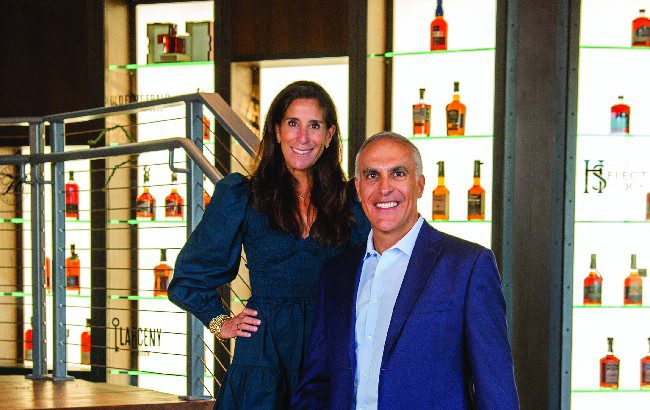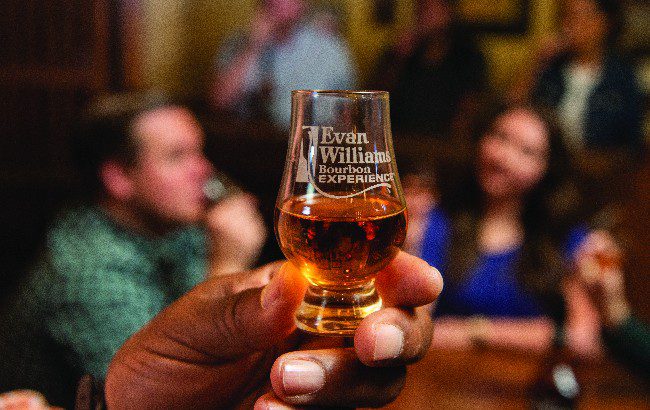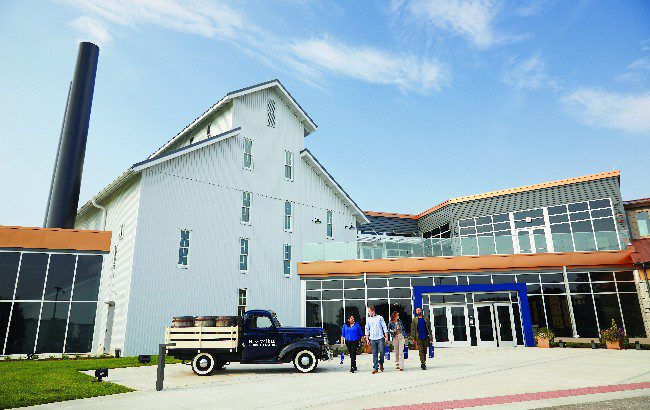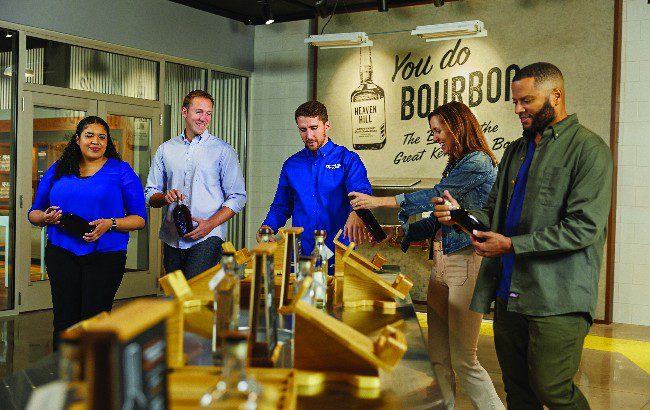This website uses cookies so that we can provide you with the best user experience possible. Cookie information is stored in your browser and performs functions such as recognising you when you return to our website and helping our team to understand which sections of the website you find most interesting and useful.
The big interview: Heaven Hill Brands
By Melita KielyHeaven Hill Brands is a family affair for Kate Latts and her husband, Allan. The couple are now running one of the US’s most nimble spirits companies, and say the future looks bright, as they tell The Spirits Business.

*This feature was first published in the October issue of The Spirits Business magazine.
Heaven Hill Brands is now in the hands of two third-generation family members. In June 2022, former president Max Shapira stepped into the new position of executive chairman, and passed his presidency baton to his daughter, Kate Latts, and her husband, Allan Latts. Their roles of co-presidents started on 1 September.
The pair joined Heaven Hill Brands in 2001, and while Kate had grown up immersed in the family business, following in her father’s footsteps was not always her goal.
“I always knew I was interested in going into business,” she tells me on the second day of her new role. “But when I went to college I was very focused on not ever returning to Louisville and to Kentucky to live.
“I had a love of foreign languages and this vision of being an international businesswoman, and I was going to fly all over the world and do something in the cosmetics industry. Fast-forward a bunch of years and many internships, and I realised wow, this consumer-marketing thing is really pretty cool.”
Kate, like Allan, attended Duke University in North Carolina, in the US. Her interest in consumer insights was piqued after business school (where she and Allan met) during the five years she spent at Procter & Gamble.
An amazing opportunity
Allan hails from Minnesota and started his career working for a systems-consulting firm in Washington DC. As their family grew with the birth of their son, they felt the pull to return to Kentucky – and also what “an amazing opportunity there could be to work for her family’s business”, Allan notes.
In 2001, the move became a reality. Kate and Allan both played to their strengths in joining Heaven Hill Brands, with Kate focusing on marketing, and Allan on finance.
“The marketing team was much smaller than it is today,” recalls Kate. “I came into a role that was focused on marketing strategy, and we as a company had just made a number of acquisitions. It was the start, really, of a transformation in how we were thinking about our marketing, exploring more consumer opportunities, as we were expanding our portfolio and developing brands. And as well as the trade tactics that we had historically used, some of the first things I worked on were some multicultural opportunities for our newly acquired, at the time, Christian Brothers Brandy.”
Working for a family-owned company was a big shift in responsibility compared with a large corporation like Procter & Gamble, but in the best way, notes Allan.
“Largely, bigger corporation job opportunities are more about depth of role versus breadth,” he says. “So at Procter & Gamble, or any kind of big company, people tend to have a job that’s a very narrow slice of responsibility – and you’re very deep into that. At a family-owned, smaller or mid-sized business, you tend to have a broader set of responsibilities. Heaven Hill is a family-owned business, and a deeper group of people have more ability to impact and influence strategy and the direction of the company. You can just be much nimbler because there’s not as much bureaucracy. You can make decisions quicker, and things can get done quickly.”

Kate agrees, and adds: “Because we have such longevity in the work that people are doing, they really dig in and feel total ownership about what they’re working on. And furthermore, we can have a much longer-term horizon in terms of making decisions that are right for the brands, versus having to make short-term decisions because you’re trying to juice the sales numbers in the short term.”
Kate and Allan take the helm of Heaven Hill Brands at a time of significant development for the company. In 2018, Heaven Hill Brands pledged US$125 million as part of a multi-year investment plan to expand its production capacity and drive tourism. The initial phase of renovation was revealed in 2019, when three tasting rooms overlooking Bardstown were opened – and over the past 18 months, the investment plans have really ramped up.
In June 2021, Heaven Hill Brands – whose portfolio includes Elijah Craig and Evan Williams – opened a US$19m visitor centre, called the Heaven Hill Bourbon Experience. The expansion boasts an immersive distillery theatre, offering guests a multi-sensory educational experience about the history of Bourbon, and there’s also a tasting room, a ‘you do Bourbon’ lab, a bar and a kitchen.
New distillery
More Bourbon-related announcements followed in April this year when news broke that Heaven Hill Brands would open a US$135m whiskey distillery in Bardstown, Kentucky, by 2024.
“The American whiskey industry is one of the hottest spirits categories,” enthuses Allan. “The company was founded with American whiskey, and there’s a distillery in Bardstown that went up in 1935 – it was built in three months, which is kind of crazy – and that distillery was where we made all of our whiskey until a fateful day in 1996 when we had a fire that destroyed the distillery.” Flames engulfed the distillery, seven rickhouses and almost 100,000 barrels of whiskey.
After the fire, Heaven Hill acquired the Bernheim Distillery in Louisville, Kentucky. While distillation was moved here, bottling, maturation and other functions continued in Bardstown.
Following multiple expansion efforts, the distillery reached its maximum capacity, signalling it was time for Heaven Hill to bring its Bourbon production back to Bardstown.
“We will continue to operate our Bernheim Distillery in Louisville, but this new development is all about growth and making sure we can distil enough whiskey so that in five years, or more, we can sell the whiskey that there is the demand for,” Allan says.
Therefore, it’s not just about distillery expansion; the company is also investing heavily in new warehouses, building between one and three warehouses a year. “Each of those is upwards of US$15m each,” Allan says. “We have great confidence in American whiskey and the growth that’s going to come from our brands.”

The US is the “dominant whiskey opportunity in the world”, Allan notes, making it the company’s number-one market. “Europe is probably number two; Europe has been a challenge for the American whiskey industry in the past five years. Many of the markets in Europe are more on-premise-focused, so Covid was particularly damaging to a lot of the distilled spirits segment in the region.”
Not only that, but American whiskey was caught in the crossfire of the infamous Boeing-Airbus aircraft dispute between the US and Europe. Europe set tariffs on American whiskey imports “inhibiting the growth of business for all companies into Europe”, Kate says. Thankfully, those tariffs have now been removed.
Looking more closely at Europe, the UK holds huge opportunities for Heaven Hill’s whiskey portfolio, Allan adds. Australia is also demonstrating a penchant for American whiskey, he notes, “and even China and Asia show good opportunities”.
Kate adds: “We’re seeing some really interesting activity on our Evan Williams brand in South Korea, actually. We have a great partner in South Korea who’s really leaning into opportunities on that brand, and I would say that’s taken us by surprise – in a good way.”
Heaven Hill’s growth plans don’t stop at expanding its current capacity; strategic acquisitions are also important to its long-term growth trajectory. In February this year, the company bought Samson & Surrey for an undisclosed sum. The deal included Samson & Surrey’s six-brand portfolio: Tequila Ocho, Few Spirits, Widow Jane American Whiskey, Brenne French Whisky, Bluecoat Gin, and Mezcal Vago, and the firm’s facilities.
“We, as a strategy for Heaven Hill, have been working to premiumise our portfolio by launching brands in that more premium segment,” Allan says. “The founders of Samson & Surrey bought brands that had national and international growth opportunities in the hottest spirits categories across the board. In American whiskey, Widow Jane and Few are both in this super-premium price point, growing a bit of differentiation for us, as they were Bourbon products not centred around Kentucky; Few is in Chicago, and Widow Jane is out of Brooklyn, New York.”
He notes the rapid rise of Tequila as an equally exciting opportunity. “Tequila is arguably growing faster than American whiskey in the US, and Ocho, with its quality and tradition, is one of the really sought-after, up-and-coming brands in the Tequila category – that’s exciting. And mezcal is very small and niche, but is growing, and has captured a lot of interest, especially in the mixology world.”
With Bluecoat Gin, Kate and Allan note how US consumers have not yet reached the same level of interest in gin as drinkers in the UK, “but we’ve seen pockets of success, it’s there”, insists Kate.
Exciting integration
Samson & Surrey remains an independent, wholly-owned division of Heaven Hill, and the company’s co-founders – Robert Furniss Roe and Juan Rivera – remain part of running the company. “We bought not just a great set of brands, but a great set of competencies as well,” Kate adds. “It’s been an exciting integration.”
Ensuring that future ways of working are as sustainable as possible are also paramount to the company, the Latts stress. In 2021, Heaven Hill unveiled its first official environmental sustainability strategy for the next decade.
By 2030, the company aims to have improved its water-use efficiency by 15%, to have cut its carbon emissions from operations by 30%, in line with the Paris Climate Agreement, and provide visitors with zero-waste experiences. Conserving ecosystems that support the business through sustainable agriculture and forestry will also be prioritised. Heaven Hill has, for example, offered to cover costs for the voluntary logger-training programmes. Kate and Allan explain it’s important to the company because these are the people who first handle the natural resources that then become Bourbon barrels.
As much as Kate and Allan’s appointments signal a new era for Heaven Hill Brands, the pair see no serious alterations to the company’s strategy in the near future. “We might tweak around the edges,” says Allan, “but we’ve been here now for 21 years, and in the past few years we’ve had a big impact on helping set the strategy for the company. Any time fresh leaders come in, we are taking a fresh look at the business and working with our executive leadership team to assess our strategy, and see if there are opportunities to refresh it. But we want to be thoughtful, and consider the input from our amazing team members as a company as we embark on that.”

Kate adds that she is looking forward to growing the company’s portfolio in its native US market, and internationally. Neither co-president rules out future acquisitions when the time is right.
“This is very much a company that’s about building relationships,” Kate says. “And this is one of the superpowers of my dad, his ability to connect with people at all levels of the industry, and all levels of the company.
“My dad can walk through our bottling facilities and know who’s who among our production team, whose kids are getting married next year, how many siblings they have. And that is tremendous. That was really something he took pride in, and something that was front and centre of my dad’s wisdom to us, to have a real focus on those relationships because we are a family at Heaven Hill Brands, and that’s something we never want to change.”

